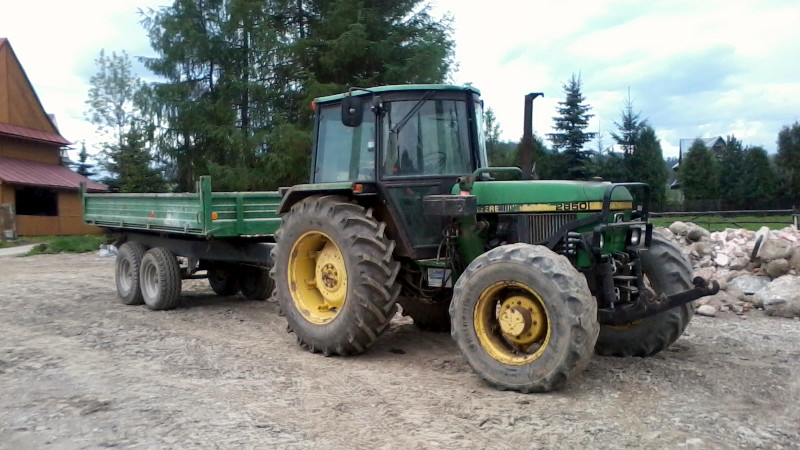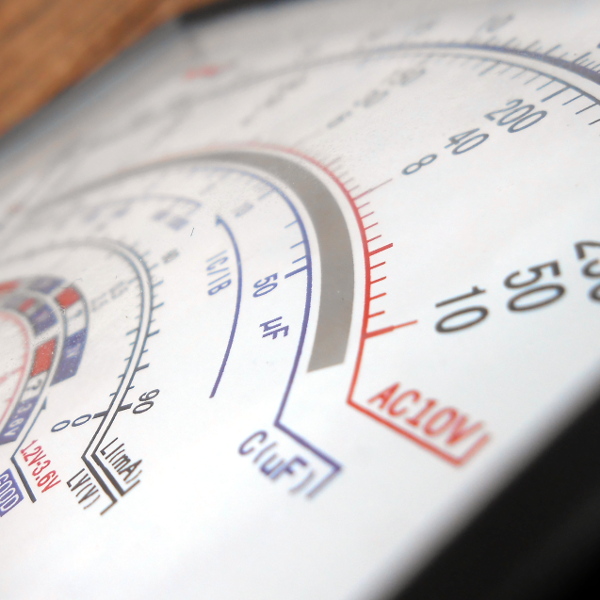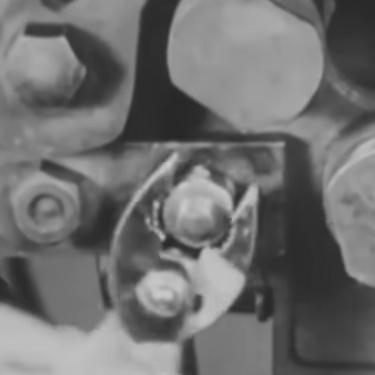It’s fair to say that the hearts and minds of Hackaday readers lie closer to the technology centres of Shenzhen or Silicon Valley than they do to the soybean fields of Minnesota. The common link is the desire to actually own the hardware we buy. Among those working the soil there has been a surge in demand (and consequently a huge price rise) in 40-year-old tractors.
Second-hand farm machinery prices have made their way to the pages of Hackaday due to an ongoing battle between farmers and agricultural machinery manufacturers over who has the right to repair and maintain their tractors. The industry giant John Deere in particular uses the DMCA and end-user licensing agreements to keep all maintenance in the hands of their very expensive agents. It’s a battle we’ve reported on before, and continues to play out across the farmland of America, this time on the secondary market. Older models continue to deliver the freedom for owners to make repairs themselves, and the relative simplicity of the machines tends to make those repairs less costly overall.
Tractors built in the 1970s and 80s continue to be reliable and have the added perk of predating the digital shackles of the modern era. Aged-but-maintainable machinery is now the sweetheart of farm sales. It confirms a trend I’ve heard of anecdotally for a few years now, that relatively new tractors can be worth less than their older DMCA-free stablemates, and it’s something that I hope will also be noticed in the boardrooms. Perhaps this consumer rebellion can succeed against the DMCA where decades of activism and lobbying have evidently failed.
They just don’t build ’em like they used to.
[Image Source: John Deere 2850 by Raf24 CC-BY-SA 3.0]
[Via Hacker News]

















It’s exactly why I will never own a Deere.
It would make quite the statement if all farmers dropped locked in and contract tied farm equipment, and bought equipment imported free of such restrictions (https://www.grainews.ca/2015/06/08/belarus-is-back/). The resulting glut of dumped equipment would make a far larger message. Also are the rental equipment companies (https://www.combinerental.com/) having the same issues with “right to repair”?
Part of the problem is that farm implement retailers are few and far between. Some areas may only have a single retailer within a reasonable driving distance. If they need a tractor worked on, they may have no choice but to buy a specific brand.
And after that, stopped buying patent-locked seeds. But it may be good business for the farmer even if it is ideologically disgusting.
There’s no Deere like an old Deere. Mine (for property maintenance and hayride service, not working farm. Also has a flat belt pulley which can be used to drive my lathe and large drill press if I put line shaft up in the shop) is about to turn 75 and still pulls like crazy. Did its first 45 or so pulling implements on a farm about an hour away from my house.
Sounds like you have the old popping johnny. They were very good tractors even though they only had two cylinders and a hand clutch.
oddly enough, I hear the civil engineering machinery sector is also having a resurgence in prices for older equipment. basically driven by known/ proven repair issues, design for maintenance and better uptime ( no regen cycles needed etc.)
I’m so supportive of this trend in getting the non-dmca equipment. If you own something, you have the right to fix it.
Does anyone know if the US allows class-action lawsuits over racketeering and Tying https://en.wikipedia.org/wiki/Tying_(commerce)
I always assumed copyright laws like DMCA do not shield a company from other areas of the law.
Maybe Deere needs a judge to given them finacial Texas Bullseye
“Does anyone know if the US allows…”
The United States exists for the benefit and facilitation of corporate profits and the wealth accumulation by the already wealthy. Once you understand that, everything makes perfect sense. Laws are drafted by corporate lawyers and politicians are bribed… errr… lobbied to pass those laws by the corporations they’d benefit. The Supreme Court has deemed corporations to be people, and has ruled corporations spending *unlimited* amounts of money to influence elections (to their benefit, of course) amounts to free speech and can not be abridged.
So no, while there may be laws against racketeering, they’re pretty much never enforced because, again, corporate interest rules all.
Vertical Tying would apply if John Deere actually sold you the equipment. Since they’re merely selling you a multiple hundred-thousand dollar licence to use their equipment, tying doesn’t apply.
Yes, in the US, it is known as “franchising”
B^)
Additionally in many cases John Deere isn’t even selling the farmer the equipment in the first place. Many times the farmer is buying/leasing the equipment from a local “representative” or “distributor” who actually bought the equipment from Deere.
As a kid I used to go to my grandfather’s farm and he would do all sorts of repairs and upgrades to his farm equipment including tractors much like the one in the picture. There was always something pulled up to his shop building to be worked on. If he didn’t have what he needed he just modified what he had. I think his cutting torch, closely followed by his welder were probably his favorite tools. The welder was decades older than myself and ran on a voltage that was stepped up from the 110 or 120 circuit in his shop using an also-ancient motor connected via an old car fan belt to a generator. He would have to kick it to start it. I still remember the sound it made as it turned and don’t really have the words to describe it.
One project that stands out in my mind was when he needed another trailer but what he had was an extra, beat up old pickup truck. After a day with his torch and welder the truck was no longer a truck, it was a new trailer in his parking lot and a bunch leftover parts on his scrap pile!
Although I live in the city, have a postage stamp yard and work on much smaller items I am sure that watching my grandfather and wanting to grow up to be like him are a huge part of the reason I am a maker today.
This. Growing up in a small blacksmith/agricultural eqpt biz made me what I am today.
I trained Ag as engineer at start of the analog/ digital interface CAV Lucas fitted a digital governor to a cav rotary fuel injection pump the changes in torque backup were amazing and fuel use as well as power out put .. the 135 Fergerson was a completely different machine . Additionally Ford had a power shift transmission that needed a laptop to fine tune it … so mid 80’s on this was the picture…
>soy screwing with estrogens
You might want to verify your sources buddy.
Just verify your sources. You can have a cigar eating diet for all I care.
A quick (5 minute) look at the author and his website doesn’t give me a lot of faith in this book as a source. A few more minutes skimming abstracts does not dissuade my doubts. He has credentials and has a position with a respected organization, but some of the things on his site lean a bit to the extreme on the unsupported side, like his rejection of fluoride toothpaste (see https://www.ajconsultingcompany.com/whatiuse.html) and his stake in “personalized DNA analysis”. I am not curious enough to spend $300 to find out what his “1-hour DNA consult” with “Coach Maya” entails, either.
There’s no gray area- he is a known crank. Do not make dietary or health choices based on one book written by Some Guy™. Live by the settled science, which is what your doctor will tell you.
[Quinn Dunki]
I know him personally,
he is not a crank.
Maybe you don’t agree with his research on Estrogen, and its results, or maybe you don’t agree on his personal life, but NONE of those qualify him as a “crank”.
Have a nice day.
[Quinn Dunki] I was trying not to be antagonistic. All being antagonistic does is harden the beliefs.
I haven’t really found anything that would indicate that he is a “known crank” and have not run across him (to my memory) in the past. References?
Based on what is on his site, I am inclined to take anything he says with a large grain of salt and much further research, but, my personal opinion aside, he doesn’t have a high profile on the worst of the crank sites, though many of his cheerleaders, and a few places he publishes, are unreliable (to be charitable)
If you have more information, please let me know so I follow up and add him to my watch list.
Don’t believe everything you read. People have been eating Soy for a very long time.
There is only one agriculture machinery manufacturer in US or I’m missing something?
It’s not just Deere doing this to us, all do this now, Deere is the most recognizable name in the world though hence its reference to generally mean the tractor, whether a Deere or not.
Much like calling it a Phillips screwdriver when it is also known as a cross tip!
No, this DMCA crap is pretty unique to Deere.
Is not why 10000 signature to JD to continue making the 50/20 series analog machines ????
Nope. I own a 2016 VW Tiguan 4-Motion. VW does EVERYTHING they can to keep me from knowing anything technical about that car. During the warranty period all you had to do is look at the car crooked to void the warranty. Heck, I can’t even buy a spare owner’s manual! It’s too bad because otherwise I like the car (2016 was the last year the Tiguans in the U.S. were any good). This obsession with over priced dealership service lock-in makes this the last VW I will ever own.
Tractors. We are talking about tractors.
“Much like calling it a Phillips screwdriver when it is also known as a cross tip!”
I knew of a guy who referred to his screwdrivers as “plus” and “minus”.
B^)
There’s definitely more than one – Case IH would probably be the next biggest. John Deere just has the worst reputation for locking stuff down.
I don’t think Case IH has locked things down. I know that John Deere definitely has and farmers are using hacked software to fix their high-tech tractors to get around it.
In other sectors the financing is often part of the issue and why people have more limited options than you’d think. Not sure whether that applies here, I’m not that familiar with the industry in the US.
Count on California to make it illegal to own an old tractor.
Actually California is on the front lines with this one, and has fought for the consumer Right to repair. Just recently a watered down version of what was desired was passed, as a sell out by the lobbying group. However, that is a first step, and gives room to fight for more.
You probably should show less of your arrogance and isolated education by maybe talking about something you are more familiar with!
Lashing out at strangers under your company name can’t be good for business.
He may not be as far off as you know. My neighbor was forced to sell his old dump truck because new diesel regulations applied to old vehicles. He would have had to spend many thousands of dollars to upgrade the thing. Instead, he sold it to a guy who scrapped everything except the dump box. What a waste.
Swap in a modern motor. Make the EPA happy.
The modern motor needs all the computers to run, and all of this is heavily integrated into the rest of the machine (example: CAN bus).
it needs just one and there’s 0 reason to keep it locked, look at how most Mahindra stuff is built – ancient tractor design with a somewhat modern motor with an ECU and an SCR system. That’s it.
If Deere keeps this crap up, they will find themselves out of business, because someone will listen to their customers and give them what they really want – a tractor that lasts.
“Off Road” machinery typically gets grandfathered when environmental and efficiency standards are updated. Sometimes there are safety standards that apply retroactively, but these are relatively few.
If you’ve ever looked carefully at all the exposed moving bits on old farm equipment – many of them right next to the operator – the first thought that goes though your head is “Holy s***! How does anyone survive working with these things?”
“the first thought that goes though your head is “Holy s***! How does anyone survive working with these things?””
Probably by being a farmer first, not a YouTuber with a farming channel. ;)
My mother dated a John Deere mechanic back in the 80’s, and he had some stories of people sueing Deere for doing stupid things like getting their limbs caught in the PTO attachment point, despite the multiple warnings and the safety covers.
I think the actual answer would be ‘using common sense’ and respecting the equipment.
My husband grew up in farm country, and his observation was that the first thing the farmer did when he bought a new lawn mower was take the chute cover off the mower deck (the part that keeps you from sticking your hand in the chute to clear the stuck grass away from the moving blade). They also left the safety cover off the PTO shaft, because in farming, time is money, and you don’t need all that safety sh*t if you just work carefully.
There’s an old comedy routine “Fun with farm machinery…or how to hold a coffee cup with just 3 fingers!” (Otis XII-Mean Farmer). While it is meant as a joke, the people that produce our grain, vegetables and meat have work that has more in common with construction, logging and heavy manufacturing than it does with the golden sunsets of TV commercials. They do it without the benefit of an HR department, safety office or employer-paid health plan. Their farms and equipment can often be heavily indebted. I’m not surprised there were some that would try to shift the expense of an injury to what they may have regarded as a faceless entity with deep pockets. That happens off the farm, too, and it is why we have lawn mowers that have chute covers and shut off when you let go of the handle, backup cameras on new cars, and the key fobs that cost $500+ to replace.
That’s all nice and everything, but growing up Midwest every small school had at least one family where a parent had lost a limb to a machine, or a family member’s life to an auger. Every single farm kid went to farm safety camp at some point so we all had common sense and respect for machines. In reality those things only get you so far without luck because some day you forget and do something wrong, or make a bad assumption, or maybe just get unlucky and the unexpected happens. The only way to be safe is to take proactive measures to be safe.
Also, just so you know, those safety sleeves on PTO shafts don’t actually offer any safety. They spin fast enough with enough torque to still catch things. You just have to stay clear and hope you never trip walking past them.
Soybeans are a great source of protein, hardly a waste. I’ve eaten them for forty years in various forms, I see nothing negative.
As I recall, the estrogen issue gave a scare, but there was a reversal or partial reversal somewhat later.
Just living can be risky.
“Just living can be risky.”
Methane build up can be quite serious. :-p
dont light any matches :)
The “soy causes hormone issues” scare comes from a combination of ignorance and misreading data. The original study they used to “prove” the correlation was a study where every man selected was already having issues with their ability to father children, and didn’t represent normal healthy individuals.
Not to mention the obsession some people have with spreading this notion tied to “low T males” (Because apparently blood tests aren’t real and the real way to tell if someone is “low T” is because they’re skinny). See the fellow further down for an example of this.
Point is, it’s basically an old wive’s tale. The study never proved what they said it did, but they keep doubling down with any scrap of tangentially related data they can pile on the fire.
We just left the farm a little over a yr ago here in South Dakota. The new Deere sure are neat and pretty and capable of so much, but totaly damn useless when they suddenly stop in the middle of the field of corn or soy. Wont stay running or wont drive, have to call a tech out an dlose the day of production with a tractor stuck in the field you have to walk back and forth to and fro. when we are plowing miles of fields a day, we dont have time for this shit, and the end consumer has no clue, what we go through to produce feed for cattle or people. The cost is only slightly higher at this point, but if the practice of being locked out of the Deere keeps up, the guy wanting corn or soy to feed his cattle, are going to pay a higher price eventually, and that will effect us more.
We are watching many farmers , and in particular their boys being sent to tech schools now to learn how to work on them. We watch techs come out in their new shiny trucks and I am wondering, does Ford make Deere pay for the repairs to the truck in the field, and at what cost?
I have watched some guys hack the hell out of new tractors just to get the hydraulics working when the software performs with a glitch.
The cost is THOUSANDS, on average $2500-5k per damn visit, this is madness that farmers have to go through any of this. if we buy the damned thing, why dont i own it, why am I owning the hardware but leasing the software, and yet the hardware wont work without the software, we are being held hostage to a god forsaken piece of….software!
I hope more people read and understand this, and help fight for the right to work on our own equipment electronics and tractors!
If I made bike racks for Deeres so at least you didn’t have to walk home, how many do you think I’d sell?
I once owned a John Deere 10-speed bicycle.
It was green, but more of a gray-green.
DMCA PROTECTED:
https://images-na.ssl-images-amazon.com/images/I/71xPNI5T9wL._AC_SL1500_.jpg
No, not that one!
B^)
More like this one:
https://smithauctions.hibid.com/lot/12583311/john-deere-mens-10-speed-bicycle/?qs=100&ref=catalog&q=36q
I hear you. British farming communities have different priorities sometimes, but the same things apply.
And yes, we have a Deere outside. It’s about 35yo.
How about something from a peer-reviewed scientific journal instead?
exactly! Pointing to one book on amazon is hardly worth anything even if it’s written by someone with a ph.d.
Being a whack-job isn’t constrained to people without a ph.d.
(no sarcasm)
As a Minnesotan in the market for a used tractor:
The John Deere 4010, 4020 and other tractors made in the 1950’s are selling for their original prices.
Many Ford 8n, 2n, and 9n tractors (circa 1940’s) are selling for their original prices or more.
Kubotas are popular for small tractor buyers.
As someone who can’t take time off from work to attend farm auctions:
I depend on Craigslist, and other sources to find available tractors.
Big market for classic tractors in the UK too. I have a hankering for a Ford Major myself, will probably never get one.
You may already be familiar with https://www.lamborghini-tractors.com/en-xx/ and https://en.wikipedia.org/wiki/Porsche-Diesel_218
Have you looked into old International tractors?
In a consumer society/economy, when government won’t address bad behavior, it’s up to the consumer to do so. Pretty much every industry is in need of a consumer rebellion. Unfortunately, there’s no solidarity in society today. If the farming industry boycotted John Deere to the point of bankruptcy, how quickly do you think other manufacturers would eliminate or cancel plans for DMCA schemes?
One should notice that all the copyrights malarkey is due to the government maintaining ever-tighter copyright and patent laws that enable these corporations to pull off this kind of carp.
I think you may be overthinking it. The inflated prices for used old tractors are evidence of increasing demand for them. That implies demand for new tractors with locked software is decreasing. A couple of things are likely to result: 1. Price for new tractors with locked software will be lowered to compete, causing JD et al. to reconsider their market scheme. 2. Other open tractors available new will be more highly valued because of it and will therefore be in higher demand, all other things being equal. The degree to which these things affect JD’s market share and profitability are directly related to the cost to the consumer.
Any “consumer rebellion” that takes a form other than the market forces I described is artificial and not likely to be effective in the long run. Obviously the problem is not *that* bad or else people would stop buying their tractors in favor of ones that are a better value. Oh wait I guess that’s what people are doing.
And as for governments that “won’t address bad behavior” I say this behavior is enabled by DMCA so the government is the problem not the solution.
Let me see if I can understand this… if the consumers continue to buy unlocked tractors instead of locked tractors, this will be a “natural” way of correcting the problem, but if there is a “consumer rebellion” it will be an “artificial” correction of the problem? How can “consumers reacting to locked down equipment” not equal “consumers reacting to locked down equipment”?
Chris’s comment was about “consumer rebellion,” “solidarity,” and “boycotts” and lamented that they were not occurring. Those are not the same as normal market pressures. I’m not sure how such things would be accomplished but the call to action was to instigate something that is not occurring naturally—hence the contrast with artificial.
Science data says, meh.
https://www.ncbi.nlm.nih.gov/pubmed/11880595/
As a farmer in the EU, I can’t conceive the idea of having any DMCA machinery! I’m free to repair and make needed modifications in any equipment I own.
All maintenance and Almost ALL repairs (exception for engines) is done in house.
Also, I can’t conceive the idea off be sitting waiting for the JD official mechanics, o even waiting for the JD official parts!
In agriculture, time is money!, Waiting 2 days for someone or for some parts may compromise an entire crop.
Shame om you JD!
I can just see some idiot at John Deere saying “Eventually the used market will dry up, then we’ve got ’em.” when they’ve completely forgotten about this option..
https://en.wikipedia.org/wiki/Doodlebug_tractor
And all the old plans around to repurpose like the tractor plan scans at vintageprojects dot com and implements at
www dot countryplans dot com/vintage_farm/ … all begging to be re-imagined with modern obtanium parts.
Farmers with a modicum of shop skill will be converting jeeps and pickups left and right, or having the local 4×4 specialists build them one. I know JD is in that market as well, but it will probably also have the result of giving the makers of some side by sides and small utilities an “in” to make stuff a bit bigger and a bit bigger until they’re eating JDs lunch, supper and next days breakfast.
“I can just see some idiot at John Deere saying “Eventually the used market will dry up, then we’ve got ’em.” when they’ve completely forgotten about this option..”
Farmers making their own tractors,
That is how Versatile got its start, some farmers wanted larger, heavier duty tractors, and found the engines/transmissions/axles/ they needed in mining trucks.
You’ve just been responsible for half an hour of my time, browsing doodlebug tractors. :)
Jenny, Many were made along guidelines found in the May and June 1939 editions of Popular Mechanics. There was a series of hardbacks put out during the depression, illustrated in classic Popular Mechanics style–one on made farm equipment another on made machine shop equipment, another on improvised woodworking– They may deserve an article all their own, along with the early Red Cover Popular Mechanics Encyclopedia. A link on the PM inspired doodlebugs: https://www.gasenginemagazine.com/tractors/popular-mechanics-build-your-own-tractors
Ooh, thanks for that!
Rather than build a completely custom tractor etc, I see aftermarket plugin control modules being developed, much like aftermarket ECU’s as used by performance car tuners.
As soon as that equipment is out of sight of JD, the modules are swapped out for the aftermarket gear.
Need warranty? Swap it all back and then call JD for service.
It’s not just tractors… just saw a Gold Rush episode where a large pump was disabled by the onboard computer. The site where it was deployed had come into WiFi range and the pump decided to upgrade the firmware (without asking). After that, it refused to run.
Like windows 10, forced updates. People need to vote with their wallet. I know I help a friend of mine bypass all the computer crap on his JD hydraulic system. Screw the computer.
I believe the problem with that pump was the diesel particulate filter system the EPA has forced on all diesel engines.
The system is a nightmare and add a lot of complication to a diesel engine with a filter that gets clogged and has to go through a very high temperature burnout cycle in order to stay running.
Lots of sensors and a computer running the engine and a ton of added cost to even a water pump.
The EPA also has emissions specs and control now on push lawnmowers.
The EPA needs to be ended now, it has gone way beyond it’s scope and purpose.
Nah, polluting diesel engines need to be ended ;-)
What is on the shelf (right now) to replace them?
(crickets)
Cummins makes spark-ignited natural gas B- and C- engines that are drop-in replacements, same bolt pattern, re-use your existing flexplate. Torque curves are different, but you’ve got gears, right? Versatile, CaseIH, and maybe now Kubota have used C series blocks, so it’s feasible. Kubota M8 is a Cummins engine but I don’t remember the series off the top of my head.
There was a Mack spinoff (that may have been bought back by Volvo Mack, hard to tell) that used natural gas spark ignited mills for California model garbage trucks. But I suspect Volvo Mack is leaning electric – they sold a few for garbage service in NYC – dead quiet on third shift at least until it dumps. Kubota has already said their electric model is getting close to ready – and this is a market where a literal ton of batteries is an asset, not a problem. :-)
“The EPA needs to be ended now, it has gone way beyond it’s scope and purpose.”
I think its scope and purpose are pretty well covered in its name.
I like to be able to breathe. Maybe you aren’t real concerned about it, but I do.
The regulations do not address HOW the limits are met. Only that they ARE met, and that the methods used are tamper-resistant. Most manufacturers have gone to the same set of tools (urea for nitrogen oxides control, particulate filters, and so on) as the most economical, from their point of view, way to meet the requirements. I do not know if there are better alternatives for all of these in every case, but in some applications the rules are met other ways.
Much of the additional cost is due to issues with the manufacturers cutting corners, making poor design decisions, and customers not wanting to pay more up from for greater reliability. It is also in part to manufacturers wanting to make it difficult to bypass the controls (a requirement, and, in my opinion, an important one, as I periodically work in a region where the locals ‘roll coal’), as well as to lock in a revenue stream for repair parts and service (fiduciary responsibility to the shareholders pushes this way)
If you don’t agree with the rules, you are more than welcome to a neighbor that “rolls coal” for 10 hours straight 50m from your front door, trying to get the maximum volume without fouling the exhaust valves or turbo. Really. Please. Take him. He’s yours.
In celebration of “internalizing the benefits to oneself, externalizing the costs to society” don’t forget to clip the seat-belt buzzer.
I could make good money with the work I do bypassing epa regs. However I chose not to charge beyond my opportunity loss, because I don’t care about the money. Diesel emissions reductions were hurried and unrealistic with the majority of the burden placed upon the end user.
Asian countries have been eating soy for millenia.
tell us more about your desire to look at people’s privates
and also tell us more about how the Chinese have difficulty reproducing
China population (hits enter)
(Google) 1.3 Billion
I judge a military by their generals myself.
First, I don’t like the lockout stuff. But might John Deere be trying to avoid having custom firmware mods put into their tractors for performance some other nonsense like people do with Diesel trucks. I can understand them not wanting the headache.
The third party firmware modification liability may be a red herring. Maybe John Deere et. al. have promoted this “threat” as a way to justify the lock down because it drives business to the service side of the business which is more profitable than the sales side
When you sell it it’s no longer yours and you lose your say.
That’s not a referral link is it?
Like many of my friends in South Alabama who own rural properties, I own a tractor. They all went for the pricey Mahindra and Kubotas and even a new Deere or two. They pay somebody else to maintain them. Me? I bought a 1984 John Deere and maintain it myself. Diesel, ROPS, front loader, the works, and it just keeps chugging along. I saved $thousand$ and have something I can maintain myself, and can modify (LED lights all around, for starters). I’m happy as a pig in mud.
Your car-truck is next. Dumb-ka will rule us all.
I wonder how long it will be until people start replacing entire tractor control systems with aftermarket stuff. If you rip out all of the electronics, you basically just have a bunch of sensors and actuators, right?
There’s already a healthy aftermarket for engine control computers for cars (Megasquirt, Link, Syvecs, Motec, EcuMaster, the list goes on), and I suspect that these could be used for tractor engines.
And then I assume there’s also a transmission that needs something to control it, and hydraulics… Could you control all of that with an Arduino or three?
Think you just came up with a great business idea.
The “you can do it with a 555” market will grow like a weed.
The “you can do it with a 555” market will grow weed!
I’m thinking some euro tractors have the same engine blocks in as some cars, Volvo coming to mind, so megasquirt application on those might be as simple as seeing what the car guys did and copying it on the tractor.
The hard thing about transmission controllers is the modulated clutch applications and wear and fluid condition compensation parameters. Have to either be able to dump and translate it from the stock controllers, or do a hell of a lot of testing to derive it yourself. Hell of a lot meaning 100s of thousands of miles under every condition you can think of. They do exist, but typically only suitable for racing, as it’ll be slam, bam clutch application (Actually most efficient and not as hard on the clutches as letting them slowly grind against each other coming up to speed) and wear compensation done by recallibrating manually, and fluid condition always assumed to be perfect as you change it out every race day.
“I’m thinking some euro tractors have the same engine blocks in as some cars,”
There’s the Urban Legend, that Lamborghini started making sports cars after an argument with Mr. Ferrari.
He told his engineers, “you know that V-12 engine we make (for our tractors), build a sports car around it.”
IIRC, a Triumph sports car engine was originally a small tractor engine.
How long until they start following the printer business model. The tractor is almost free but you have to pay big bucks for the mandatory, quarterly software updates?
You realize that by posting that wonderful business idea to an open forum, John Deere won’t hire you? :)
nothing tells big companies they screwed up like a massive dip in their profits.
But, Gillette still thinks it did the right thing losing $8Bn in value by telling men that they were “toxic”.
Same thing applies to vehicles. When emissions controls mandated by the government and engine power reductions mandated by insurance companies (and the way such reductions were done made emissions worse) started in the early 1970’s there was a loophole. “One Ton” trucks were not required to have any emissions controls until sometime into the 1990’s. Manufacturers could put whatever engines in them they desired.
So Dodge famously made the Lil Red Express and Warlock pickup trucks for a couple of years. Party like it’s 1969! Gobs of power, no AIR pumps or catalytic converters.
So if you’re in California, which mandates that vehicles produced from 1975 to present must maintain their *factory original* emissions controls (thus making it illegal to upgrade with newer technology to *reduce* their pollution) despite Federal law exempting vehicles over 25 years old – get a 1 ton truck from the 70’s or 80’s. Their factory original emissions controls are NONE and the State can’t make you install any. Get a two wheel drive one, slam it to the ground, even put light duty 1/2 or 3/4 ton suspension under it, drop in a big old hotted up V8. CA can’t complain because the VIN says it’s an emissions exempt vehicle.
I should advertise my 1982 Sierra 3500 flatbed with freshly rebuilt 350 with throttle body injection and 700R4 transmission in California.
I am not a fan of JD or what they are doing with the closed systems, but to be fair, an awful lot of the new reactors is in the GPS/computer stuff, and the farmers around me are just not capable of dealing with it on their own. One of the reasons they buy the Deere stuff is there is a local dealer who can come out and make it work for them.
I have not seen anybody around here attempt to add third party automation to old iron. Sure there is always some “farmering” of tractors, but nothing much more ambitious than welding on mounts for a loader they can plug into the live hydraulics. One of my old tractors is 100% stock, the other some farmer along the way took the 6V generator off and put a 12V alternator on, and welded on a mount for a hydraulic pump. I think at one time it had a simple up and down blade farmered onto it for plowing the driveway.
As far as prices.. Old iron, more than ever small old iron goes for a lot more than it should because everybody who lives in a rural area wants something with a loader on it. I got a full sized backhoe loader for less than most people pay for compacts, just because it was not compact. You see this in a lot of things. If you wanna do sheet metal fab, it is not unusual to find brakes and shears that are 6 to 8 feet long going for less than a 24 or 36″ unit. A lot more people have room for a small one.
CAT does the same thing! There are knock off interface devices and cracked versions of their diagnostic software, but they use an 18 character code to allow the technician to clear certain fault and event codes. The machines are designed to derate the first time it thinks something is wrong. I had a CAT 420E derate when it detected a slight fault with the NOX reduction system. Paid $750 for a DEF dosing valve made by Bosch and sold for much less if purchased for other makes. I then had to pay some schmuck to clear the event because we have yet to find a crack for the 18 code. So cat came to the site cleared the code and then spent 4 hours running a DEF/DPF self test requiring barely any input from the tech who spent most of his time on site playing games on his phone from the cab or his work truck. But hey at least a giant corporate entity made a few dollar’s to satisfy the shareholders.
“but to be fair, an awful lot of the new reactors is in the GPS/computer stuff, and the farmers around me are just not capable of dealing with it on their own.”
(to the tune of “We didn’t start the fire”)
“GPS satellite,
something isn’t quite right!
I don’t know just what to do,
it says I’m farming in Peru!”
-Mylo Hatzenbuhler, “I couldn’t start the tractor”
As a regretful Benz owner I get it… Every electronic component on a Benz is locked to Big Germany via SCN coding (Screw Customer Now) BUT — we are all missing the point!!!! this is America, home of capitalism !!! I am too old and too tired to do this myself, but SOMEONE PLEASE build the Mega-Squirt of the 2020’s for the John Deere!!! Riches and fame are an AVR and FET driver away from you!! (and I say this as a persona friend of Al Grippo — look it up!) C’mon guys, this crap is not magic! (As a former owner of a company that made EFI components and as the guy who broke the flash on the MazdaSPEED3) This is an easy to solve “replace that stupid DCIM ECU” problem. I cant wait to see companies competing to build “Off road” ECU’s for JD tractors.
Yep look at the men from Buzzfeed aka: The Try Guys. They drink lots of Soy and have the Testosterone levels of a 90 year old man. and are built like bean poles.
And those flexible plastic bottle we all love cause a reduction in T.
Modern lifestyles are also response for a dramatic drop in sperm counts as well – some 60%.
Given all the T lowering aspects of modern life I’d say avoiding Soy for a male isn’t a bad idea. Of course if you like the Low T lifestyle and the noodle arm look by all means keep on guzzling Soy.
Not to mention 80% of the US population lives in urban areas, despite conservative efforts to portray the midwest as the ‘real’ America.
Weird, as I’m pretty sure the thirteen colonies were all, you know, EAST COAST.
Sheesh!
The original 13 colonies were more agrarian than the Midwest is now!
My mums washing machine has broken down. The error message suggests it’s the tacho on the back of the motor which needs replacing.
Why does it need a tacho ?
Spin the drum, if it’s 800rpm +/-100rpm who gives a….. ?
Why stop it from working completely cos it doesn’t know what speed the mtoro is moving at ?
Ridiculous.
My washing machine is significantly older, mechanical dial with mains sync’d clockwork motor.
Much less to go wrong so much so that it’s never gone wrong.
Things are throw away because they are too complex to fix or not worth fixing becasue a new one is so cheap.
But it didn’t used to be that way, until manufacturers figured out they couldn’t sell new product if they actualy made them to last.
I can buy a £100 washer with a 3yr guarentee. Why can I not buy a £500 one with a 20yr gaurentee ?
And also people are lazy. I had a side gig fixing Dysons. The amount I get with nothing wrong other than a clean must be 30% of them but the owners throw them away.
I was surprised to find a perhaps 50 cent SPST switch in my mains powered Dyson beneath the enormous, maybe 40mm round translucent purple on/off button. The stem on the switch would have barely been more than a few square millimetres, and the plastic internals of the switch were what had failed.
Truly a triumph of marketing driven industrial design over design for longevity.
because they have equipped your washer with a brushless DC motor probably which needs the encoder to time the switching of the waveforms. I totally sympathize with the frustration. The environmentalist overlook one thing in their quest for energy effeciency. If the damn thing only lasts a year we have all that manufacturing and disposal waste.
When you buy appliances made in Mexico, don’t be surprised when they occasionally need a taco.
Geez…
Why not develop an open source set of controllers for these machines? CAT pulls the same shit. At the end of the day these proprietary controllers and software are seeing input from and actuating devices that are not proprietary. A negative coefficient temp sensor behaves the same regardless of what its connected to. There is such a demand that it would make it profitable to devote resources to the project.
Something many have to realize is that JD and companies like it make much more revenue off of parts sales than new unit sales. In reality, they are selling something that will generate future parts sales from inevitable repairs, and are designed to wear in certain ways during general use in order to make that future revenue stream happen. In the more distant past, there were non-OEM suppliers for say, a diesel fuel pump, starving them of that revenue for that repair.
One thing JD specifically started doing decades ago to combat this revenue loss was a “mechanical DRM” in making parts that require proprietary tools to remove, install, or perform maintenance on. One example is the hydraulic cylinders for a front loader attachment that are designed in such a way as to require a proprietary spanner to remove the end caps. It is possible to remove these without the proprietary equipment, but not without damage that could make future maintenance more difficult, if not impossible without parts replacement. Furthermore, the components themselves such as the piston, rings, and seals were non-standard sizes requiring custom fitment.
This modern trend of systems integration and the application of DMCA is an extension of this doctrine of limiting the end user in their repair options.
Another factor that needs to be addressed in the trend in all industries away from component-level repair to module-level repair. The analogy here in electronics is having a failed component, such as a resistor, being easily replaceable opposed to replacing the entire board that the failed resistor resides upon. This trend is exhibited in power machinery as well with designs that prohibit or inhibit component-level repairs in favor of full replacement of the damaged module. Alternators are the first thing that comes to mind for me with designs that destroy themselves if attempts are made to disassemble them, but I have also seen diesel fuel pumps that have an integral manifold where the distribution lines are actually brazed into place without mechanical fastening that can be detached, requiring the entire fuel distribution system to be replaced, from the pump to the cylinder in the event of a single failure. To me personally, this is an insane design error, but it assures future parts sales revenue by making the entire fuel “module” for that particular engine a single, expensive, unit sitting on a shelf ready to be sold.
Add to all this the trend of offering field repair services for power machinery. This is no small thing, as not only do they lock down the parts sales and tooling mentioned above, but also the fees associated with the servicing itself. It is not uncommon to see per-hour fees associated with these services being $100-$300. On a field tractor, even something as simple as changing a tire can develop into a lengthy operation. First, they are heavy and frequently require some form of mechanical assistance just to move. There may or may not be a tube. Further, they frequently aren’t just a tire filled with air. They may be filled with liquid calcium chloride ballast, a nasty substance that needs to be removed from an old tire and added to a new one using specialized equipment. Each tire and application requires a specific ratio of this stuff in the tire to have it all work properly. That’s not even getting into deeper repairs such as the transmission… on some designs you need to remove the cab entirely and all the linkages to it, then split the front of the tractor from the rear. We had one in our shop for weeks doing this, waiting for parts, then having some fabrication performed. No small task. Lots of money, though.
All of this trend towards non-user-servicable parts(and software, for that matter) is due to corporate doctrines of locking out competition and maximizing revenue streams. While some can say that it is fiduciary responsibility to make that happen, there’s a line that is crossed whereupon an item that is “sold” to a consumer no longer belongs to the consumer, but is simply an item that the corporation permits the consumer to make use of and function as a conduit for perpetual revenue. I’m looking at you, Microsoft. I want my computer back. It sucks, but that’s where we are and these corporations, in aggregate, know full well that we just can’t live without their stuff…. so we are at their mercy.
OK, I’ll save you some headache with calcium chloride solution – just use beet juice. Google it. Works great. And you can get the filler adapter at Tractor Supply.
Shifts the repair problem to a mom-and-pop shop. Oh, wait that’s the OTHER part of “right to repair”. Also les we forget repair people don’t always like all the rigamarole involved in fixing things even if it means more money (but not usually for them but the shop they work for).
And of course once that part is no longer available (their choice) you are in line for the new model….. or a proude owner of a worthless cactus tractor
And similar thing is going to happen with old cars in EU. But for different reasons. Average car age is risig up. Why because stupid regulations. Last year was probably lost one when you could buy car with decent engine.
The average age of cars is rising in the USA.
Why? Because cars last longer than they did 10,20,30,40,50 years ago.
Actualy modern cars are less reliable than cars few years back (1.0l 3cyl turbo for mid size sedan is not a good idea). When I was young student we used to buy really cheap old cars. (for 100-200usd) We run them until they did not pass technical inspection. Or we somehow damage them. Then we scrap them or used for spare parts. We had lot of fun with these cars. But now there is not many cheap cars on market. Why? because you have to pay up to 500usd registration fees for old car. And also you cant unregister car without scraping them first (No cars for spare parts). That is why many people keeps them as second or third car. Car is still too good for give it away for free because with that fee its not possible to sell it.
Bring back Heavy Horses.